Renowned manufacturer announces showcase of innovative water-heating solutions slated for American Society of Plumbing Engineers event in Bellevue, Washington, Sept. 28-Oct. 1 Bradford White Water Heaters, an industry-leading manufacturer of water heaters, boilers and storage tanks, will showcase a wide range of its high-performing and energy efficient products at the 2023 American Society of Plumbing Engineers Read more
ASPE
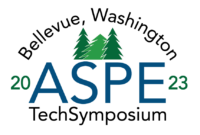
Renowned manufacturer announces showcase of innovative water-heating solutions slated for American Society of Plumbing Engineers event in Bellevue, Washington, Sept. 28-Oct. 1
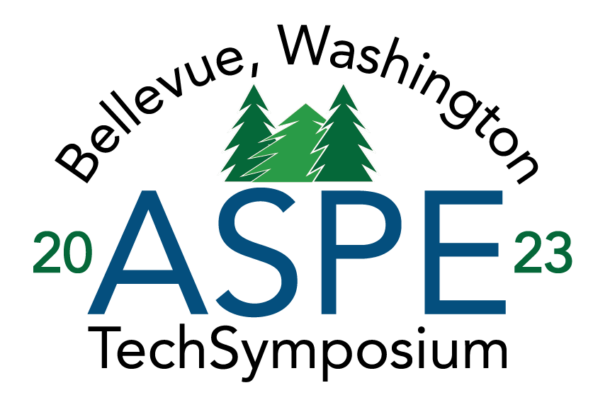
Bradford White Water Heaters, an industry-leading manufacturer of water heaters, boilers and storage tanks, will showcase a wide range of its high-performing and energy efficient products at the 2023 American Society of Plumbing Engineers Tech Symposium in Bellevue, Washington, Sept. 28-Oct. 1.
“The ASPE Tech Symposium is one of the most informative and inspiring events of the year for the rapidly evolving plumbing industry,” said Neal Heyman, director of marketing for Bradford White. “Our product experts are looking forward to this opportunity, where they can help professionals in our field discover solutions that meet and exceed their customers’ high standards of quality, reliability and performance.”
Representatives from Bradford White Water Heaters will be at Booth #500 during the symposium product show to meet with attendees and discuss the following Bradford White products:
- Aerotherm® Heat Pump Water Heater with Bradford White Connect™
- eF Series® Ultra High Efficiency Commercial Gas Water Heater
- ElectriFLEX Series™ Commercial Electric Water Heaters
- Vitraglas® Tank Lining with Microban®
The 2023 ASPE Tech Symposium is the premier opportunity for plumbing engineers and designers at all career levels to engage in productive technical exchanges and networking. Attendees can choose from a variety of professional development sessions designed to teach participants how to integrate the most current design techniques into their projects. During the show, the industry’s top manufacturers will showcase their newest products and teach attendees how to apply them in their plumbing system designs. For more information, visit https://www.aspe.org/2023-tech-symposium/.
For more information about Bradford White Water Heaters, visit https://www.bradfordwhite.com.

Watts has announced a new webinar: New Tech in Backflow Prevention: The Future is Now. It’s ASPE-accredited and worth 0.1 CEUs. On Wednesday, August 16, 2023, 12:00 p.m. ET., participants will learn about: What backflow is and why it is required The principals of continuous monitoring Understanding connectivity considerations and options The nuances of indoor Read more
Watts has announced a new webinar: New Tech in Backflow Prevention: The Future is Now. It’s ASPE-accredited and worth 0.1 CEUs.
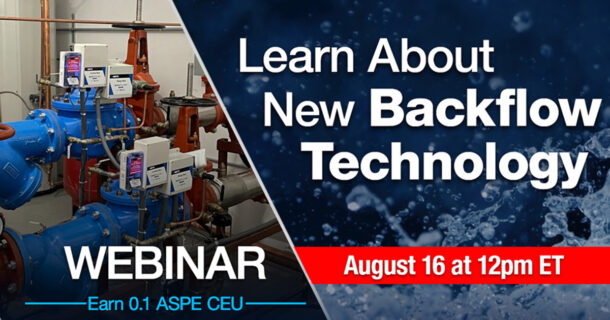
On Wednesday, August 16, 2023, 12:00 p.m. ET., participants will learn about:
- What backflow is and why it is required
- The principals of continuous monitoring
- Understanding connectivity considerations and options
- The nuances of indoor vs. outdoor installs
- Sustainability in backflow prevention
Visit watts.com/BackflowDayCEU to register.

Watts is pleased to announce a live APSE-accredited CEU webinar — “Data Center Server Cooling Optimization.” This webinar is tailored specifically for engineers, architects, designers, specifiers, and facility managers involved in retrofitting, expanding, or constructing data center facilities. On Tuesday, July 25th at 12 p.m. ET, attendees will learn about how a well-designed cooling system Read more
Watts is pleased to announce a live APSE-accredited CEU webinar — “Data Center Server Cooling Optimization.” This webinar is tailored specifically for engineers, architects, designers, specifiers, and facility managers involved in retrofitting, expanding, or constructing data center facilities.
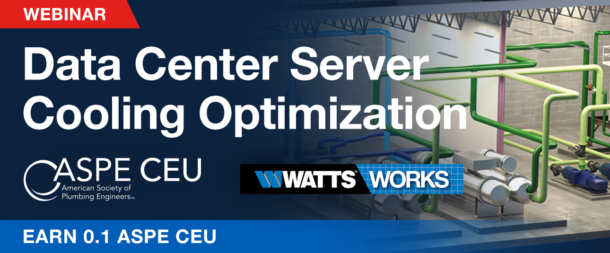
On Tuesday, July 25th at 12 p.m. ET, attendees will learn about how a well-designed cooling system can increase the efficiency of a data center and lower operational costs. Participants can earn 0.1 ASPE CEU that counts toward professional development and licensure requirements.
In this webinar, industry subject matter experts will discuss:
- Different server cooling technologies
- How server cooling interfaces with chilled water systems
- Optimizing the interface of server cooling to building chilled water systems
- Controlling thermal expansion
- Sizing of the expansion tank and pressure relief valve
To register, www.watts.com/DataCentersCEU.
Watts has announced “Pressure Management for Water Loss Control in Public Water Systems” – an ASPE-accredited webinar worth 0.1 CEUs. On Tuesday, April 25, 2023, at 12 p.m. EST, participants will learn how managing pressure in public water systems both improves water efficiency and mitigates water losses. Attendees will also learn how active management of Read more
Watts has announced “Pressure Management for Water Loss Control in Public Water Systems” – an ASPE-accredited webinar worth 0.1 CEUs.
On Tuesday, April 25, 2023, at 12 p.m. EST, participants will learn how managing pressure in public water systems both improves water efficiency and mitigates water losses.
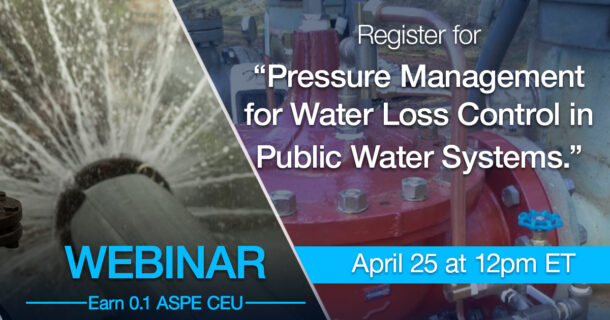
Attendees will also learn how active management of pressure in Public Water Systems (PWS) helps to meet service needs while extending asset life and reducing instances of infrastructure failure. Through actively managing pressure, a PWS is able to address the EPA’s Intervention step for real water losses.
The webinar will review:
- Providing cost-effective solutions to water loss control.
- Understanding effective control valve features in managing “background” leakage.
- The value of retrofitting existing control valves to mitigate real water losses in public water systems.
- Adding double check control valve stations to mitigate water pressure transients and backsiphonage conditions.
To register, click here.
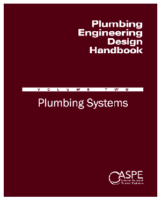
The American Society of Plumbing Engineers (ASPE), the foremost authority on plumbing engineering and design, has released the latest updated volume in its Plumbing Engineering Design Handbook series: Volume 2: Plumbing Systems. The profession’s leading reference text, ASPE’s Plumbing Engineering Design Handbook (PEDH) encompasses more than 50 chapters in four volumes and provides comprehensive details of Read more
| The American Society of Plumbing Engineers (ASPE), the foremost authority on plumbing engineering and design, has released the latest updated volume in its Plumbing Engineering Design Handbook series: Volume 2: Plumbing Systems. |
The profession’s leading reference text, ASPE’s Plumbing Engineering Design Handbook (PEDH) encompasses more than 50 chapters in four volumes and provides comprehensive details of the accepted practices and design criteria used in the field of plumbing engineering. Volume 2 covers the most commonly found plumbing systems in commercial facilities, including sanitary, domestic hot and cold water, venting, storm drainage, fuel gas, water and wastewater treatment, and more. Whether you want to learn about the right design practices or the engineering change order process, you can find everything you need to know in the latest guide. The engineering handbook has everything you need to know about business and residential plumbing and engineering. How to Access Volume 2The PEDH is one of ASPE’s most valuable member benefits, and ASPE members can access all four volumes as eBooks for free. Nonmembers can purchase the Volume 2 eBook for $259.95, but a better option is to join ASPE to gain access to the entire series for free, a savings of more than $800. To join the ASPE family and take advantage of all of our professional development and career-enhancing benefits, visit ASPE.org. |

